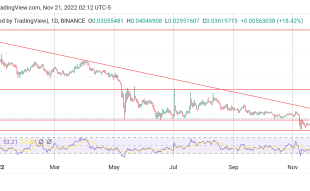Join Our Telegram channel to stay up to date on breaking news coverage
During these difficult times, as rumors fly about how much cryptocurrency will be worth following the catastrophic collapse of the cryptocurrency exchange FTX and other significant platforms, a crucial question has emerged: “Who will keep your cryptocurrency safe?”
As a result, some members of the cryptocurrency community are urging a return to its decentralized origins.
“Not your keys, not your coins” is one of the movement’s rallying cries. Or, only have faith in yourself.
But in order to do so, people must manage their own cryptocurrency wallets, which is a trickier but safer method that necessitates creating sophisticated passwords and occasionally purchasing real hardware to store money as opposed to entrusting it to an exchange.
A company like FTX was intended to keep your funds, but instead, they ended up lending them out, stated Tracy Wang, deputy managing editor at the cryptocurrency news website CoinDesk. The traditional monetary system is based on this idea, which appears to conflict with the core tenets of cryptocurrencies. Wang compared decentralization to regaining control of one’s own finances and power.
According to information from the cryptocurrency association CoinGecko reported by Reuters, FTX was the world’s fifth-largest cryptocurrency exchange before it collapsed, processing $627 billion in trading volume year-to-date.
As FTX navigates a bankruptcy procedure that its current overseer has previously characterized as unparalleled in its complexity, it is still uncertain whether anyone who retained their money on the exchange would be made whole. For those who were most negatively impacted by the company’s insolvency, it is also a painful awakening and the catalyst for a return to decentralization.
It then boils down to choosing between the possibility of someone stealing your money, even though the exchange makes it simpler to purchase, send, and hold it, and maintaining complete control of it at the expense of a laborious accounting procedure.
Not a simple process
But doing it isn’t particularly simple. Creating a set of public and private keys—a string of randomly generated letters and numbers—and a second, backup seed phrase—consisting of 12 or 24 random phrases in case you lose the initial set of keys—are necessary to keep cryptocurrency offline other than for trading. Purchasing a USB-like gadget that serves as a piggy bank for your cryptocurrency is also required.
When it comes to bitcoin, it used to be the norm. However, as the use of cryptocurrencies increased, businesses and exchanges emerged that made it possible for anyone to purchase cryptocurrency without taking these steps.
Platforms that today appear to have been unaffected by the FTX crash, such as Coinbase, have made an effort to reassure its users that their assets are safe and, in some cases, not subject to lending.
But for some users, that might not be sufficient.
Founder and CEO of the cryptocurrency company Custodia Bank and blockchain consultant Caitlin Long declared, “Those of us grizzled veterans have seen this game before. Since FTX collapsed, there has been a tremendous wave, and we’ve been trying to warn people; get your coins off exchanges.”
Over the previous two weeks, more than 150,000 bitcoin worth around $2 billion have been removed from exchanges, according to a report published on Friday by Bitcoin Magazine.
But for some significant crypto players, moving completely off the grid would be a mistake.
Instead, there are increasing calls for tighter regulation that would compel cryptocurrency exchanges to keep client funds firewalled so they cannot be used for other purposes.
According to Long, the concept is to treat client deposits similarly to how a valet treats a car.
“You’re merely transferring temporary custody for storage. They cannot lease it to be used for Uber, and if the garage files for bankruptcy, they cannot take your car away because it is not a garage asset. This is pretty basic and dull, but it’s important.
Long used Wyoming as an illustration, claiming that the state’s cryptocurrency legislation already mandate that any exchange operating there treat consumers’ funds in this manner.
Long said that FTX would not have taken place if Wyoming’s regime had been in existence.
Senators Cynthia Lummis, R-Wyo., and Kirsten Gillibrand, D-N.Y., are the main sponsors of a bill that is comparable to the Wyoming system and is currently working its way through Congress.
However, this law and others that call for regulating the cryptocurrency business may encounter pushback. The chairman of the Senate Banking, Housing, and Urban Affairs Committee, Sen. Sherrod Brown of Ohio, stated last week that cryptocurrencies still don’t offer “anything useful or beneficial.”
“The recent collapse of FTX is a loud warning bell that cryptocurrencies can fail,” Brown said in a statement. “These failures can have a rippling impact on consumers and other sections of our financial system, much like we witnessed with over-the-counter derivatives that contributed to a financial crisis.”
“Given the ongoing turbulence in the cryptocurrency market, we must carefully consider how to govern cryptocurrencies and their place in our economy.”
Users Favor DeFi Protocols as Centralized Crypto Exchanges Experience Ether Outflows
Users can trade cryptocurrencies on a DEX (decentralized exchange) in a non-custodial setting without the requirement for a middleman to handle the transfer and custody of funds.
DEXs use blockchain-based smart contracts to replace traditional intermediaries, such as banks, brokers, payment processors, and other organizations, to enable the exchange of assets.
DEXs provide complete transparency into the movement of funds and the processes supporting exchange, in contrast to typical financial transactions, which are opaque and carried out through middlemen that provide very little insight into their actions. DEXs also lessen counterparty risk and can lessen systemic centralization problems in the bitcoin ecosystem because user money don’t transit via a third party’s cryptocurrency wallet during trading.
Due to its permissionless composability, DEXs are a key “money LEGO” upon which more complex financial products can be built. DEXs are a cornerstone of decentralized finance (DeFi).
How Does a DEX Function?
There are various DEX designs, and they all have advantages and disadvantages in terms of feature sets, scalability, and decentralization. Order book DEXs and automated market makers are the two most popular varieties (AMMs). Another popular type is DEX aggregators, which search across various DEXs on-chain to get the best pricing or lowest gas cost for the user’s intended transaction.
The high level of determinism attained by employing immutable smart contracts and blockchain technology is one of the key advantages of DEXs. DEXs carry out deals utilizing smart contracts and on-chain transactions as opposed to centralized exchanges (CEXs), like Coinbase or Binance, which use their own matching engine to enable trading. DEXs also give customers the option to trade while maintaining full custody of their money in self-hosted wallets.
Network fees and trading fees are the two main types of expenses DEX users are normally expected to pay. While trading fees are collected by the underlying protocol, its liquidity providers, token holders, or a combination of these organizations as stated by the protocol’s design, network fees refer to the gas cost of the on-chain transaction.
The use of decentralized finance (DeFi) technologies is growing
Decentralized finance (DeFi) protocols are becoming more and more popular as evidence mounts that major centralized cryptocurrency exchanges are losing ground.
In the seven days since FTX’s demise, most DeFi protocols, according to data analytics platform Nansen, have seen double-digit percentage growth in users and transactions.
One decentralized cryptocurrency exchange on the Cosmos blockchain ecosystem, dYdX, has witnessed a 99% rise in users and a 136% increase in transactions.
The markets for digital assets show the growth: The price of the dYdX token (DYDX) has increased 77% despite the fact that 88% of digital assets in the DeFi sector have fallen in value in the week leading up to Tuesday due to the effects of FTX’s collapse.
According to CoinDesk Indices, the DYDX token is classified as a part of the CLOB (central order limit book) industry within the CoinDesk Digital Asset Classification Standard (DACS). This industry is the only one out of 36 to have a positive week-over-week return.
Decentralized lender Aave had a 70% increase in users and a 99% increase in transactions.
According to Walter Teng, vice president of digital asset strategy at Fundstrat Global Advisors, as consumers become more aware of the value of self-custody and transparency provided by DeFi protocols, they are tweeting to CoinDesk. Because of this, use metrics for DeFi protocols have increased.
Independent exchange Uniswap
Uniswap, the largest decentralized cryptocurrency exchange, has seen a 19% increase in users and a 21% increase in transactions over the previous 30 days, according to Nansen data, despite the fact that confidence in centralized exchanges has drastically decreased after the collapse of FTX.
According to CoinGecko, Uniswap’s 24-hour ether trading volume is $900 billion, which is more than Coinbase, OKX, and Gate.io put together.
Additionally, Uniswap’s Web App has 55,550 daily fresh transacting wallets, which is a 2022 high.
“Self-custody and transparency are in demand and consumers are flocking to what they know and trust,” Uniswap Labs tweeted.
Value of token flow on centralized exchanges
Users are choosing to keep their bitcoins somewhere else, which has resulted in a massive flight of wealth from centralized exchanges.
Binance had the greatest net outflow (outflows less inflows) among centralized exchanges over the previous week, amounting to over $1.44 billion. Thus, users on Binance have made $1.44 billion more in withdrawals than deposits. (Nansen’s token flow value by exchange only takes into account ETH and ERC-20 tokens based on Ethereum.)
With a $1.24 billion negative net flow, OKX came in second. With a net outflow of $900 million, FTX ranks third among all companies, while Kraken lost $586 million.
FTX US, Kraken, KuCoin, Coinbase, Huobi, Gate.io, Gemini, Paxos, and Crypto.com have all seen a combined net outflow of $6.33 billion over the last seven days, according to Nansen; users deposited $42.03 billion into those exchanges but withdrew $48.35 billion.
The significant outflows most likely show that users lack confidence and trust in keeping their money on centralized exchanges.
Related
- An interview with Polkadex CEO Gautham J. about a DEX similar to CEX
- FTX’s stunning collapse: what really happened
- Best Dex Coins List – Top Decentralized Exchange Coins
Join Our Telegram channel to stay up to date on breaking news coverage


